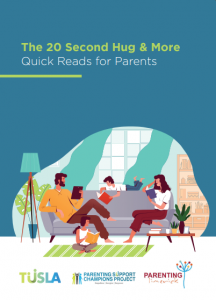Tusla – Child and Family Agency, in conjunction with Limerick Parenting Support Champions and Parenting Limerick last week launched The 20 Second Hug & More: Quick Reads for Parents. The book is a collection of parenting support articles that previously in the Limerick Leader’s Positive Parenting Feature. Covering topics which include family wellbeing, communicating with your teen about their life and feelings, and tips for parental self-care it will provide parents with high quality advice and support. This is the first article in the series.
Dictionaries define the word hug as holding another person close for affection, comfort and warmth and aren’t these all such lovely words. Even saying these words bring with it an inner glow that we all need. Perhaps one of the things that we miss the most is physical contact with those we love and care about. We miss the freedom we had to hug people. This means that the hugs and cuddles we can have within our households, particularly with our children, have become more important than ever. As children move back to school and our time together is somewhat less, it is vital that we continue spending some cuddling, snuggly hug time together. Did you know that the US has a national cuddling day every year? While it is great that cuddling gets a day of recognition it is important that we make time for hugging our children every day. As well as being a very enjoyable thing to do, hugging your child is of real benefit.
Every hug and physical touch counts however hugs that last for 20 seconds or longer are the ones that can be the most powerful. We are so used to the 20 second hand washing rule that 20 second hugs will be easy to time! Apart from being a really enjoyable activity, these longer hugs have been scientifically proven to have physical effects on our bodies. Hugs and cuddles trigger the release of the hormone oxytocin, which is also known as the feel good or love hormone. The effect of oxytocin on our bodies is complicated but its release in our brains aids physical development from a young age. Firm hugs stimulate the pressure receptors in our skin and this sends a message to the vagus nerve in our brains. This nerve plays a big part in slowing down our heart rate and blood pressure so combined with the feel good hormone; hugs help us calm down and relax.
Hugs also have an impact on our stress hormone cortisol, reducing it and at the same time stimulating our bodies to release serotonin which helps us deal with pain. This is why you can feel an immediate relief from stress and pain when you are embraced in a hug. And why our children come running into our arms when they are distressed and you automatically surround them with your arms and draw them into a loving embrace. Reduced blood pressure and lower stress levels are beneficial to the health of our hearts, to helping our bodies fight infection and to relieving pain. Who would have thought that a 20 second hug could be part of our daily fitness routine!
Hugs helps build and maintain the connection between you and your child communicating your love and helping children feel secure and safe. Hugs tell your child that you love them and that you are there for them and not a single word is needed! Start the day by giving your child a hug and always have a bedtime hug as the calming effect will help sleep. Remember to hug yourself. Did you realise that giving yourself a hug is beneficial, safe and comforting. Wrap your arms around yourself, hug tightly, and tell yourself that you love YOU!
When children are very small we have ample time for cuddling and hugging as they are often in our arms or on our lap. As children become older and naturally move a little further away from us, going to school or out to play, we may not get the same opportunity for hugs. We have to create the opportunities for closeness. Try to make time in the day for cuddling and hugging. Remember it is not the quantity that counts but the quality. Think about adding hugs and cuddles to activities you are already doing. When watching TV, snuggle up close and put your arms around your child. Cuddle in together to read a book. While it is tempting not to interrupt you child when they are doing their homework, reach out and give a hug as you walk past. It will not disturb them but let them know you love and care for them.
Teenagers can shy away from your physical attention or think it is not cool! This is normal teen development. Respect their feeling and continue to hug your teens but perhaps not in public or in front of their friends!
Hugs give immediate joy and comfort and have significant impact on health, now and later in life. Few things cost so little and provide so much. Cuddles and hugs are good for you and your child so stop what you are doing right now and reach out and hug your child.

To download The 20 Second Hug & More: Quick Reads for Parents go to: www.tusla.ie/uploads/content/The_20_Second_Hug.pdf
This article was contributed by Tusla PPFS, a member of Parenting Limerick. Parenting Limerick is a network of parenting and family support organisations



